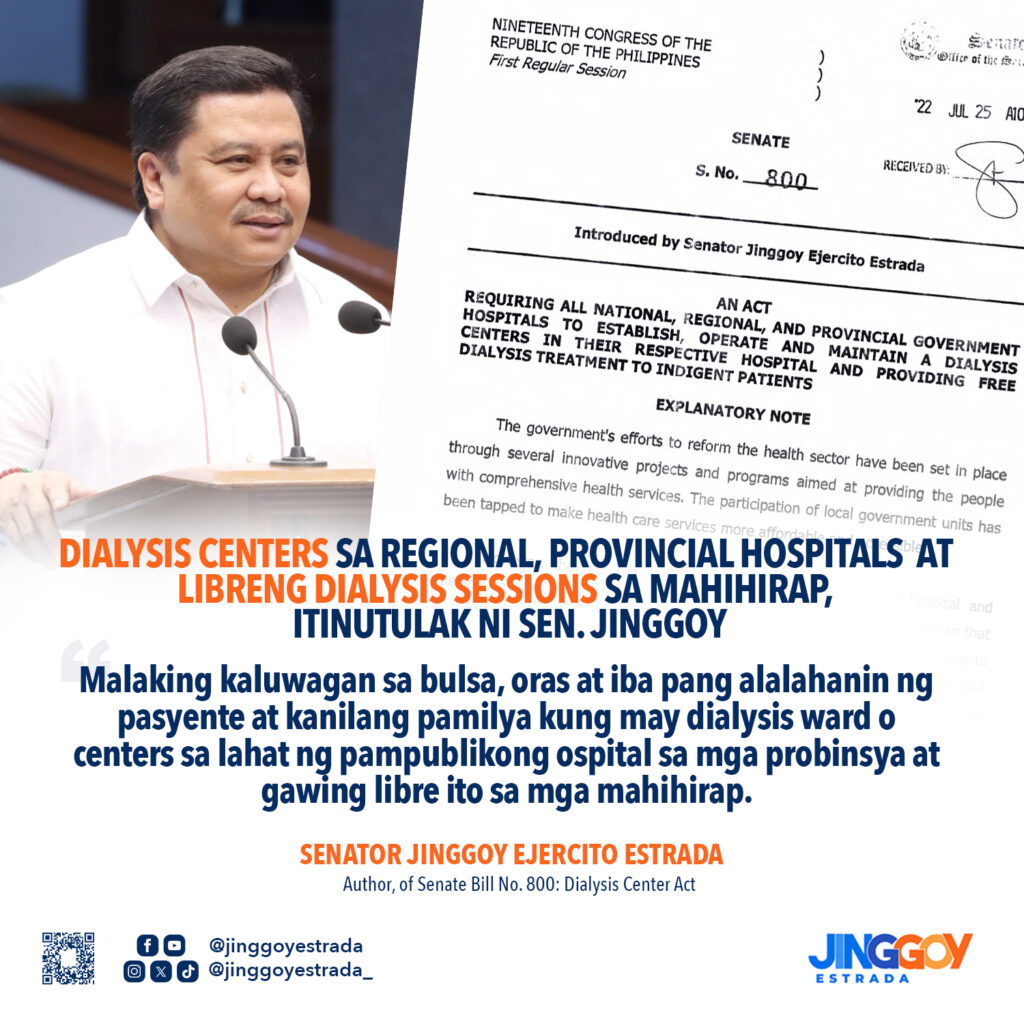SENATOR Jinggoy Ejercito Estrada has sought the passage of a law requiring all regional and provincial hospitals to set up dialysis centers to address the rising number of kidney disease cases in the country.
“Sophisticated medical equipment and advanced facilities are concentrated in highly urbanized cities. Consequently, patients from rural areas often need to travel long distances, which incurs high costs, including travel expenses. For patients with kidney disorders who require regular dialysis, these financial burdens can be especially challenging,” Estrada said in underscoring the necessity of the proposed law under Senate Bill No. 800.

“Malaking kaluwagan sa bulsa, oras at iba pang alalahanin ng pasyente at kanilang pamilya kung may dialysis ward o centers sa lahat ng pampublikong ospital sa mga probinsya at gawing libre ito sa mga mahihirap,” he also said, adding that the centers’ services shall be provided to indigent patients free of charge.
In Estrada’s proposed “Dialysis Center Act,” all national, regional, and provincial government hospitals will be mandated to maintain a dialysis center – with complete dialysis machine, equipment, and supplies – within two years from the enactment of the bill. Funding for the operations of the centers shall be included in the yearly national budget.
Latest available data from the National Kidney and Transplant Institute (NKTI) show that kidney diseases are the seventh leading cause of death among Filipinos. One Filipino develops chronic renal failure every hour, or about 120 Filipinos per million population every year.
According to the Philippine Health Insurance Corporation (PhilHealth), current estimates indicate that approximately 2.3 million Filipinos have Chronic Kidney Disease (CKD). Furthermore, in 2016, more than 36,000 patients underwent dialysis treatment, indicating a 15% increase in the number of patients in a single year.
These figures highlight the severity of the problem faced by the country’s healthcare system and the need for concerted efforts to combat the rise of CKD, the veteran lawmaker said.
“As such, policymakers, healthcare providers, and the public must become more aware of the situation and take action to address it. By doing so, it may be possible to mitigate the impact of CKD on individuals and society as a whole,” said Estrada.
Dialysis centers sa regional, provincial hospitals at libreng dialysis sessions sa mahihirap, itinutulak ni Jinggoy
ITINUTULAK ni Senador Jinggoy Ejercito Estrada ang pagpasa ng batas para sa pagpapatayo ng dialysis centers sa lahat ng pampublikong ospital para tugunan ang tumataas na bilang ng mga kaso ng sakit sa bato sa bansa.
“Ang mga modernong medical equipment at makabagong pasilidad ay nakatuon sa mga highly urbanized na lungsod. Dahil dito, ang mga pasyente sa kanayunan ay madalas na kailangan pa na bumiyahe sa malalayong lugar at nakakadagdag ito sa kanilang mga gastusin. Mabigat na pasaning pinansiyal ito na lalo pang nagpapahirap sa mga kapuspalad na mga pasyenteng nangangailangan ng regular na dialysis,” ani Estrada sa kanyang inihaing Senate Bill No. 800.
“Malaking kaluwagan sa bulsa, oras at iba pang alalahanin ng pasyente at kanilang pamilya kung may dialysis ward o centers sa lahat ng pampublikong ospital sa mga probinsya at gawing libre ito sa mga mahihirap,” sabi ni Estrada.
Ipinapanukala rin ni Estrada na gawing libre sa mga mahihirap na pasyente ang dialysis services.
Sa inihain ni Estrada na “Dialysis Center Act,” ang lahat ng national, regional at provincial government hospitals ay aatasan na maglagay ng dialysis centers sa loob ng dalawang taon matapos maging ganap na batas na ang panukalang SBN 800.
Ang mga nasabing dialysis centers ay kinakailangang mayroong kumpleto na mga kagamitan at dialysis machine at supplies.
Sa pinakahuling datos mula sa National Kidney and Transplant Institute (NKTI), ang sakit sa bato ay ika-pitong pangunahing dahilan ng kamatayan sa mga Pilipino. Kada oras, isang Pilipino ang nagkakaroon ng chronic renal failure o humigit-kumulang 120 Pilipino kada milyong populasyon taun taon.
Ayon pa sa Philippine Health Insurance Corporation (PhilHealth), humigit-kumulang 2.3 milyong Pilipino ang kasalukuyang may Chronic Kidney Disease (CKD).
Noong 2016, mahigit 36,000 pasyente ang sumailalim sa dialysis treatment, na nagpapakita na nasa 15% ang itinataas ng bilang ng mga pasyente sa loob ng isang taon.
Ayon sa beteranong mambabatas, patunay ang mga datos sa lumalalang problemang kinakaharap sa healthcare system ng bansa at ang pangangailangan na labanan ang pagtaas ng Chronic Kidney Disease (CKD).
“Dahil dito, ang mga policymakers, healthcare providers at ang public ay dapat maging mas maalam sa sitwasyon at kumilos upang ito’y matugunan. Sa pamamagitan nito, posible na maibsan ang problema sa tumataas na kaso ng CKD,” sabi ni Estrada.

